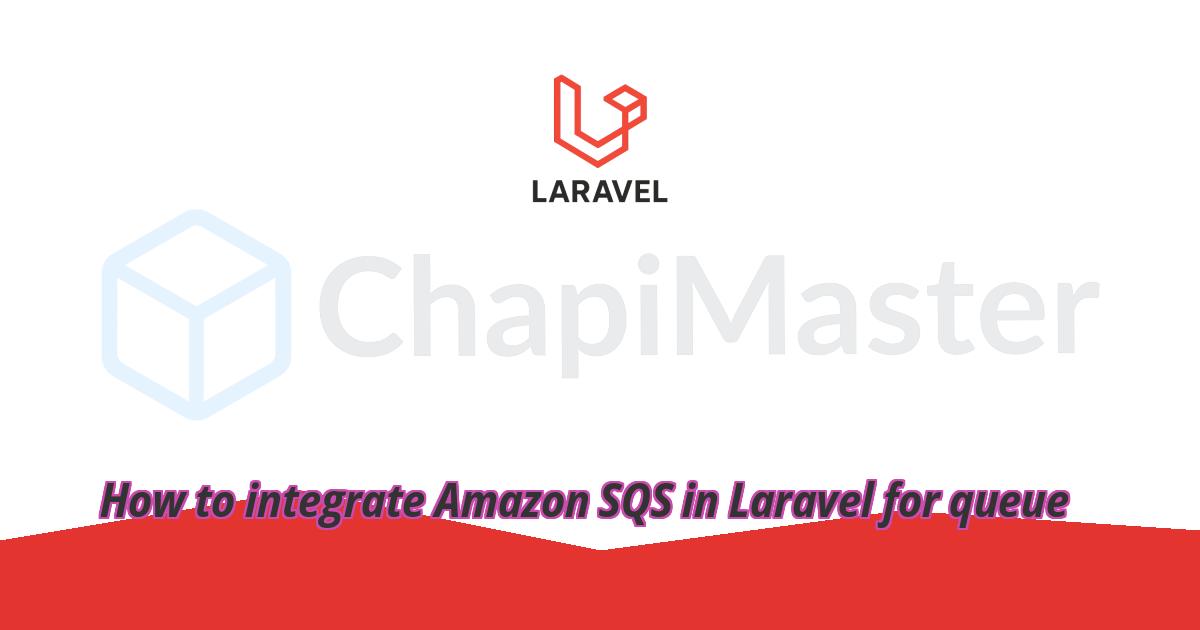What are you looking for?
What are you looking for?


Amazon Simple Queue Service (Amazon SQS) is a fully managed message queuing service provided by Amazon Web Services (AWS). It enables you to decouple the components of your applications so that they can communicate asynchronously. With SQS, you can send, store, and receive messages between distributed software components and microservices, without these components needing to be available or operational at the same time.
set the following environment variables in your .env file:
AWS_ACCESS_KEY_ID=your_access_key
AWS_SECRET_ACCESS_KEY=your_secret_key
AWS_DEFAULT_REGION=us-east-1
in config/queue.php
'sqs' => [
'driver' => 'sqs',
'key' => env('AWS_ACCESS_KEY_ID'),
'secret' => env('AWS_SECRET_ACCESS_KEY'),
'prefix' => env('SQS_PREFIX', 'https://sqs.us-east-1.amazonaws.com/your-account-id'),
'queue' => env('SQS_QUEUE', 'default'),
'suffix' => env('SQS_SUFFIX'),
'region' => env('AWS_DEFAULT_REGION', 'us-east-1'),
'after_commit' => false,
],
In your .env file, add the queue name you want to use::
make a new controller
namespace App\Http\Controllers;
use Illuminate\Http\Request;
use Illuminate\Support\Facades\Queue;
class SQSController extends Controller
{
public function sendMessage(Request $request)
{
$message = $request->input('message');
Queue::connection('sqs')->push(function ($job) use ($message) {
// Process the message or perform some task here...
$job->delete();
});
Or
// Queue::connection('sqs')->pushRaw($message);
return response()->json(['message' => 'Message sent to the queue']);
}
}
Create a new Artisan command to receive messages from the SQS queue:
Open the generated ProcessSQSMessages.php file in the app/Console/Commands directory and modify the handle method to process the messages:
use Illuminate\Console\Command;
use Illuminate\Support\Facades\Queue;
class ProcessSQSMessages extends Command
{
protected $signature = 'sqs:process-messages';
protected $description = 'Process messages from the SQS queue';
public function handle()
{
Queue::connection('sqs')->pop(function ($job) {
// Process the received message...
$job->delete();
});
}
}
You can customize queue configurations based on your needs. For example, you might want to set the maximum number of times a job should be attempted before being marked as failed. Edit the config/queue.php file:
'connections' => [
'sqs' => [
// ...
'max_attempts' => 3, // Set the maximum number of attempts
],
],
Amazon SQS offers features like delayed queues and job prioritization. Let's explore these features:
You can use delayed queues to schedule messages to be delivered after a specific delay. Here's how you can use it:
Queue::connection('sqs')->later(60, function ($job) use ($message) {
$this->processMessage($message);
$job->delete();
});
This will delay processing the message for 60 seconds.
You can prioritize jobs to control their order of execution. Higher-priority jobs are processed first. Set the priority option when pushing a job:
Queue::connection('sqs')->push(function ($job) use ($message) {
$this->processMessage($message);
$job->delete();
}, $message, null, 'high');
In this example, the job has a priority of 'high'.
By following these steps you should be use Amazon SQS in your Laravel project. if you still have question comment down below.